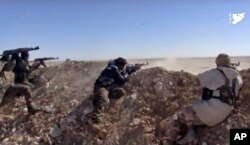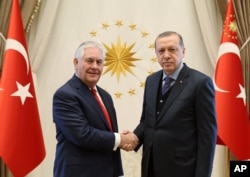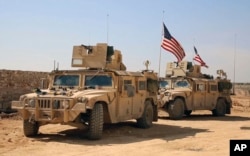Thousands of civilians have been fleeing Raqqa, the de facto capital of the Islamic State terror group in Syria, in the past few days as airstrikes on the city intensify — a foretaste of when the battle to oust the militants from the besieged city starts in earnest.
But the composition of the force to mount the final assault on the Sunni Arab city appears to be undecided, as does how the city will be governed after IS militants have been expelled.
Will it be the U.S.-backed Kurdish dominated Syrian Democratic Forces, or some of their aligned Sunni Arab and Turkmen militiamen who will retake Raqqa? Will the Turks play a role with their allied Syrian Arab rebel militias?
Will U.S. combat troops participate in significant numbers because of the tactical difficulties encountered by an indigenous, proxy ground force, much as they have in taking a more forward-leaning role in Mosul than planned?
Last month, several hundred U.S. Marines were deployed with artillery to northern Syria, to be ready to assist local forces to retake the city, according to U.S. officials, who confirmed another 1,000 troops will be sent to Kuwait to be ready if needed.
At some point during the final assault, U.S. and Kurd forces might stand aside and allow forces loyal to Syrian President Bashar al-Assad to make the final push and seize the city. Some analysts suspect that's being considered by war planners in the Pentagon and President Donald Trump's advisers.
Might Trump "judge Assad the best of a sorry lot of choices, and take the plunge to join forces with Damascus?" queried analyst Thanassis Cambanis during a roundtable discussion organized last month on the future of the conflict on Syria by The Century Foundation, a U.S. policy research institute.
Tillerson in Turkey
Last week, U.S. Secretary of State Rex Tillerson visited Ankara, the first senior administration official to visit Turkey, to try to seal a deal about the battle for Raqqa and to overcome President Recep Tayyip Erdogan's strong objections to Washington's backing of the Kurdish Democratic Union Party (PYD) militias.
Turkish forces have attacked SDF forces in the past around Manbij, west of Raqqa, forcing the United States to deploy dozens of soldiers on the outskirts of the town in a mission to prevent a repeat of clashes, which risk derailing an assault on Raqqa.
Tillerson appeared to indicate no agreement had been reached in Ankara about how Raqqa should be seized and by whom.
"They are difficult decisions, to be very frank," he said. "They are not easy, they are very difficult choices that have to be made."
On Monday, Erdogan increased pressure on Washington, saying his government is planning new offensives this spring against groups deemed terrorist organizations by Ankara, including IS, the outlawed Kurdish PKK, and the PYD's militia.
There are no signs that Washington intends to end its alliance with the PYD's militia. U.S. officials say they envisage the Raqqa battle will be similar to the fight in neighboring Iraq, where local indigenous forces have been waging the struggle to retake the northern city of Mosul, the last IS major urban stronghold in that country.
The Pentagon doubts the Turks and their Syrian rebel militias have sufficient capability or skill to wage the urban warfare they will encounter inside Raqqa, or that they will be able to minimize their own casualties or keep the civilian death toll to a minimum.
"The Kurds have been effective partners for us," a senior Pentagon official told VOA. "Why would we change horses in midstream?"
But the Kurds and their allied Arab militias will also be hard-pressed to limit a bloodbath in a city Islamic State has had plenty of time to prepare to defend. The terror group's defense tactics have been on vivid and gruesome display for months in the Iraqi city of Mosul.
Post-IS Raqqa
Analysts and former U.S. diplomats also worry not enough thought is being given to what happens after the militants are expelled from the city, and how and who will administer Raqqa. If those questions are not answered before the assault takes place, the United States could be drawn deeper into Syrian conflict than the Trump administration wants, warn some former diplomats.
They worry Washington could be on the verge of repeating the Iraq War mistakes of 2003, when the Bush administration didn't plan sufficiently for a post-invasion political order.
"Iraq 2003 and Libya 2011 teach a valuable lesson: Plan carefully for post-combat governance," said former U.S. diplomat Fred Hof.
Kurdish officials have repeatedly said in recent months they have no interest in administering Raqqa after IS militants are ousted. A local Arab council could be formed to run the city, but it would be beholden to whoever wields post-IS military power in Raqqa.
"If ISIS is going to stay down, it needs to be replaced in these areas by a sufficiently inclusive, consensual political order to short-circuit the cycle of resentment and hate that ISIS feeds off," analyst Sam Heller said at last month's roundtable discussion, using an acronym for Islamic State.














